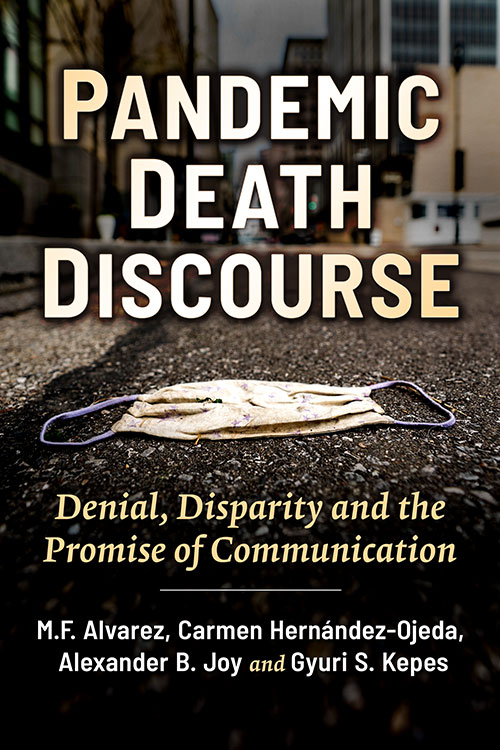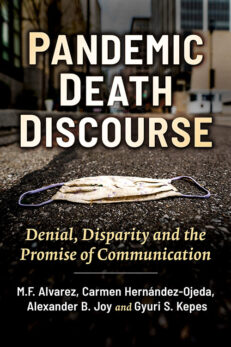Pandemic Death Discourse
Denial, Disparity and the Promise of Communication
$65.00
Available for preorder/backorder
About the Book
Since Covid-19 was declared a global pandemic, the virus has caused more than 1 million deaths in the United States and 7 million deaths worldwide. The rampant loss of life exposed fissures in healthcare systems, disrupted mourning rituals, complicated the bereavement process, and laid bare the inequities of death. Though much has been written on dying and death during COVID-19, this book is the first to attend to the communicative and representational practices through which meanings about loss during the pandemic are negotiated.
This book begins by addressing our collective death denial, and the institutional and ideological barriers that must be surmounted if we are to afford dignity and humanity to those who have been stripped of it. Against this backdrop, the authors examine an array of practices and channels through which various social groups have sought to dismantle oppressive structures, find hope amid despair, and reshape understandings of mortality, including what it means to be in community. COVID-19 has issued a challenge to our conscience and to our symbolic capacities, and this book is an earnest response to that challenge, one that is attuned to our collective vulnerabilities.
About the Author(s)
Bibliographic Details
M.F. Alvarez, Carmen Hernández-Ojeda, Alexander B. Joy and Gyuri S. Kepes
Format: softcover (6 x 9)
Pages:
Bibliographic Info: notes, bibliography, index
Copyright Date: 2025
pISBN: 978-1-4766-8654-7
eISBN: 978-1-4766-5535-2
Imprint: McFarland
Book Reviews & Awards
• “This book is about remembering what we as a society may have found convenient to forget. It’s only been four years since the worst of the pandemic, but the events and circumstances described in this book are barbed reminders that we have failed to learn much from the catastrophic costs of COVID-19. Chapters begin with an indictment of neoliberal economic philosophy that left the world without defense against anticipated pandemic, and then make the case on the ground where individual suffering was further compounded by racist, gendered, class-based assumptions fueled by the very same economic ideology. The third section of the book offers concrete suggestions for teaching about mediated framing of pandemics and the necessity of end-of-life discourse in the college classroom. My only regret in reading the book is that it has made me aware of how little humanity seems to have learned in preparation for the next global catastrophe.”—Warren Bareiss, PhD, professor of communication, University of South Carolina Upstate
• “What if death and the discipline of communication were the lenses through which we tried to understand and make sense of a major global event? … [These] essays look back to help us see the value of a direct confrontation with our mortality—not only as individuals, but as a collective. Their analyses help readers who want to go beyond politicized debates about lockdowns, masks, and vaccines to thoughtfully explore the vast material consequences of these topics and more. In the end, readers will come away with new understandings of our collective vulnerabilities, and with more compassion. This is the value of death studies, to affirm life and acknowledge our interconnectedness. It’s also the hallmark of quality scholarship.”—Jillian Tullis, PhD, professor of communication, director of biomedical ethics, University of San Diego
• “This collection offers a bold, nuanced, thought-provoking, socially engaged and well theorized exploration of pandemics and death. Examining healthcare systems, oppression and inequity, community, bereavement, loss and communication whilst drawing on a range of literature and concrete examples, it offers a wide ranging yet cohesive response in the context of an ongoing crisis.”—Dr. Bethan Michael-Fox and Dr. Renske Visser, co-hosts of The Death Studies Podcast
• “This volume explores a central but omitted aspect of the Covid-19 pandemic: death discourse. Adopting a communication perspective, the authors acknowledge the number of pandemic analyses focused on upheavals in social life, racial, economic, and geographical inequalities. However, this work directs our attention to the exploration of the discourse of death. In each chapter we are invited to consider how death discourse affords a way out of the institutionalized neoliberal parameters (or should we say barriers) to overcoming the isolation, despair, violence, anxiety, depression and other injustices attributed to the pandemic. This volume is an invitation to move beyond cultural taboos concerning death talk and, in so doing, liberates us to not only engage in death discourse but to prepare for death, during and after the pandemic.”—Sheila McNamee, PhD, professor emerita, University of New Hampshire, and founder and vice president, Taos Institute
• “Take a journey deep inside the COVID-19 pandemic. Explore thoroughly the disparities, contradictions, fissures, trauma, possibilities, and future of pandemic crises. Examining historical, political, aesthetic, and personal aspects of societal traumas, the stories and essays in this collection encourage readers to reconsider our taken-for-granted beliefs and values, and to confront the inequities and impossibilities in how people are equipped to deal with loss in the midst of oppressive structures, such as the for-profit health care system. The authors point to society’s fear and denial of death as contributing to the mismanagement of pandemic crises, and then offer creative solutions, such as frank discussions of mortality in our classrooms, institutions, and online platforms. As you read, breathe in through your belly the terrifying reality and vulnerability of death and the next pandemic, then breathe out from your heart a renewed appreciation of the value of open communication about end-of-life concerns and the necessity of hope, love, and compassion for living a good life.”—Carolyn Ellis, PhD, distinguished university professor emerita of communication and sociology, University of South Florida
• “The authors speak from a position of knowing the relevant literature, while also being mindful of how many questions have still been left unanswered about the pandemic and what it did for so many individuals.”—Emily Abellon, instructor at the University of Portland





